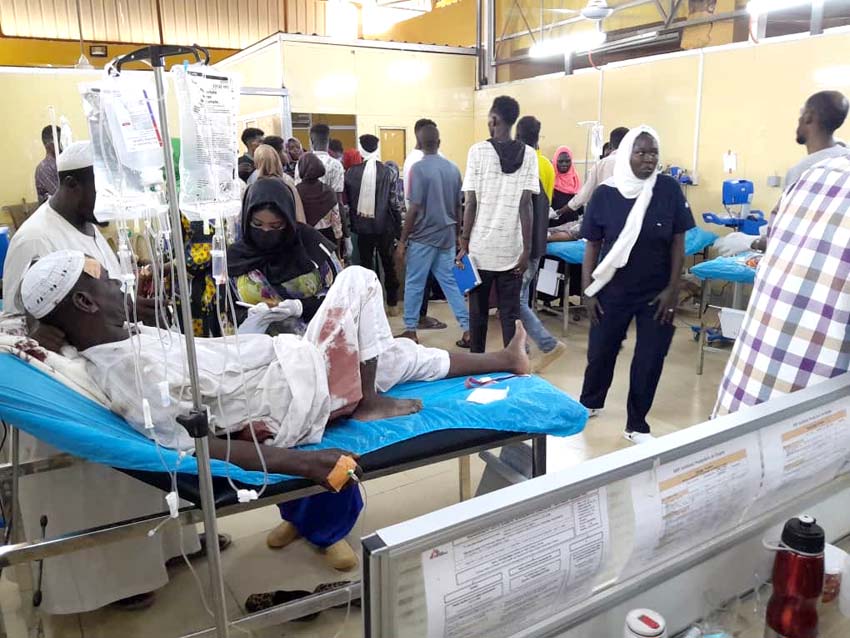
WHEN Sudan’s civil war broke out in April, conflict arose between the army and the Rapid Support Forces (RSF). Mohamed Hamdan ‘Hemedti’ Dagalo, leader of the RSF, disappeared from public view.
Rumours circulated about his severe injury or possible death until he was photographed with Ugandan President Yoweri Museveni on Wednesday.
The following day, Hemedti met with Ethiopian Prime Minister Abiy Ahmed, reportedly to discuss ending Sudan’s conflict, also visiting Ghana and Djibouti.
Analysts suggest Hemedti’s primary goal is gaining regional backing to overthrow the army and control all of Sudan.
Recently, the RSF seized Gezira state, a crucial agricultural area, tipping the balance in their favour.
However, instead of using this military advantage to negotiate peace, Hemedti seems intent on ruling Sudan, as per insights from analysts, Sudanese journalists, and diplomats.
‘Hemedti is desperate for recognition of the RSF as a governing entity.
‘This is likely why he met with various heads of state,’ Kholood Khair, a Sudan expert and head of Confluence Advisory, commented.
‘He’s attempting to mould himself into a leader,’ Khair was quoted in a report by Al Jazeera.
On December 9, the Intergovernmental Authority on Development (IGAD), an East African group, announced a forthcoming meeting between Hemedti and army chief Abdel Fattah al-Burhan.
However, Hemedti left for Uganda just before his scheduled ceasefire talk with al-Burhan in Djibouti, leading IGAD to postpone the meeting due to ‘technical reasons’.
On Monday, Hemedti conferred with Sudan’s ex-prime minister and leader of the new civilian alliance, Taqaddum, Abdallah Hamdok, in Ethiopia.
Taqaddum has extended an invitation to al-Burhan for a future meeting, though his response remains unknown.
Khair opines that both Hemedti and al-Burhan are exploiting mediation efforts for military gains.
‘This is merely a distraction … to win international favour while advancing militarily,’ she explained.
In October, the RSF overran several army bases in Darfur, coinciding with US-backed peace talks in Saudi Arabia.
Jonas Horner, a Sudan specialist, has said that the RSF’s territorial expansion, fuelled by recruits from Darfur, is unsustainable.
He highlighted the widespread resentment against the RSF for looting and atrocities.
‘The RSF’s brutality … poses a significant barrier to their potential governance,’ Horner stated.
‘Many Sudanese will never accept RSF rule,’ he added.
Despite numerous human rights violations, the RSF is trying to establish order in its territories, said Sudanese journalist Mohamad el-Fatih Yousif from Darfur.
He mentioned that the RSF formed a Civil and Political Management department, tasked with restoring essential services in Nyala, South Darfur’s capital.
‘Nyala is currently relatively safe. The RSF members responsible for looting there have moved to Gezira state,’ el-Fatih Yousif reported.
The RSF has also set up a police force in Khartoum and across Darfur.
However, many activists and analysts ridicule the RSF’s purported anti-crime efforts, holding them accountable for most of the country’s disorder.
‘This is ludicrous,’ tweeted Lauren Blanchard, a Sudan specialist at the Congressional Research Service, adding: ‘Can the RSF’s police actually arrest their own for the myriad crimes committed in Khartoum and elsewhere?’
The outlet Al Jazeera has reported a statement by an anonymous Western diplomat indicating that European countries might collaborate with the RSF if it seizes control of Sudan.
He referenced the European Union’s tendency to partner with authoritarian figures in North Africa and the Middle East to limit migration to Europe, mentioning alliances with Tunisian President Kais Said and an eastern Libyan militia linked to Khalifa Haftar.
The EU had previously engaged with the RSF in the Khartoum Process, a 2014 anti-trafficking initiative.
However, this cooperation halted after the RSF led an attack on a protest in 2019, killing over 120 people, as revealed by human rights investigations.
‘Europe denied direct support to the RSF but did so covertly. They might again, if necessary,’ the diplomat conveyed to Al Jazeera.
‘Even if the RSF is poised to take over Sudan, while the EU may publicly condemn them, it’s unlikely they’ll intervene or support any measures against the RSF’s takeover.’
Meanwhile, a recent ambush in the contested Abyei region, claimed by both Sudan and South Sudan, resulted in the deaths of six individuals, including a high-ranking local official, as reported by local authorities.
The Abyei area, rich in oil, frequently witnesses violence.
The region is at the centre of a longstanding dispute between two factions of the Dinka ethnic group: the Twic Dinka from the neighbouring Warrap state in South Sudan, and the Ngok Dinka from Abyei, primarily over the demarcation of an administrative boundary.
The incident occurred when Abyei’s Deputy Chief Administrator, Noon Deng, and his entourage were ambushed on their return from an official visit to Rummamer county, where they had been celebrating the New Year.
The attack took place on the road between Abyei and Aneet town.
According to government officials, Deng’s driver, two bodyguards, and two national security personnel were also killed in the attack.
Tereza Chol, a lawmaker from South Sudan, informed the Reuters news agency about the casualties.
Bulis Koch, Abyei’s information minister, attributed last Sunday evening’s attack to armed youths from Twic county in Warrap, noting that the bodies had not been recovered as of last Monday morning.
William Wol, Warrap’s information minister, cautioned against hastily assigning blame for the incident.
This attack adds to a series of violent clashes in the region, including an incident in November that resulted in numerous fatalities.
Abyei’s strategic location along an ambiguous border between Sudan and South Sudan has made it a point of contention since South Sudan’s secession from Khartoum in 2011.
The region is governed under a unique administrative arrangement, with officials from both countries sharing authority.
Following South Sudan’s independence, the country was plunged into a civil war that pitted President Salva Kiir against his then-Vice President Riek Machar.
Despite a peace agreement signed in 2018, which remains largely effective, the process of unifying the country’s various military factions has been s